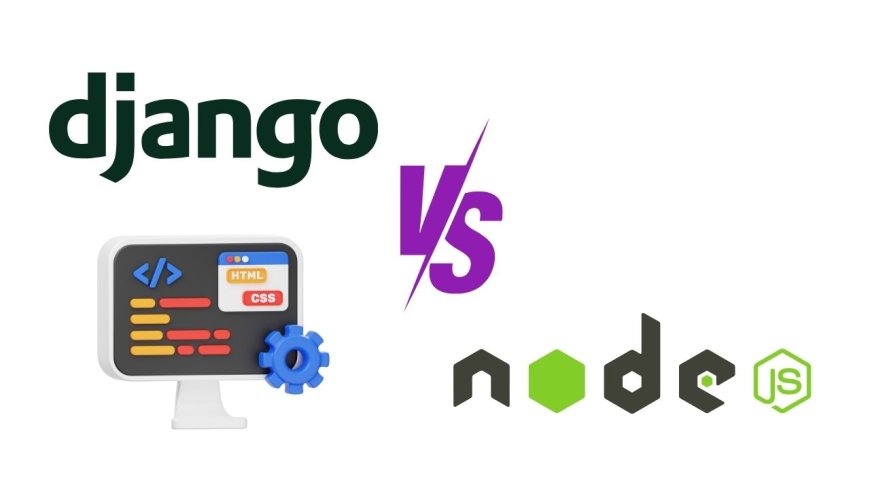Django vs. Node.js: Which Is Better for Web Development in 2024?
django vs node js

Django vs. Node.js: Picking Your Web Development Champion in 2024
The web development landscape keeps shifting as we race through 2024. Developers are constantly on the hunt for the best tools to build efficient, scalable, and dependable applications. Two frameworks have emerged as popular choices: Django and Node.js. Each has its own set of strengths and weaknesses, making them ideal for different projects. This blog will be your guide as we compare Django and Node.js across several key areas to help you decide which one reigns supreme for your web development needs in 2024.
Language and Ecosystem: Familiarity Matters
Django: Pythonistas, rejoice! Django is a high-level Python web framework that champions rapid development and clean, practical design. Python's easy-to-understand nature makes Django a fantastic choice for developers who want to quickly create prototypes and develop strong web applications. Django follows a "batteries-included" philosophy, offering a ton of built-in features like an ORM (Object-Relational Mapper), authentication system, and even an admin panel to save you time.
Node.js: Calling all JavaScript enthusiasts! Node.js is built on Chrome's V8 JavaScript engine, allowing you to use JavaScript for both the front-end (what users see) and back-end (what makes the website tick) of your development. This unification of languages can streamline development and make maintenance a breeze. Node.js boasts a vast ecosystem with npm, the world's largest software registry, offering a treasure trove of packages and libraries to supercharge your application's functionality.
Performance and Scalability: Built to Last
Django: When it comes to robust performance, Django is a champion. It's particularly well-suited for projects that require a lot of data handling, like content management systems and e-commerce platforms. While Python may not be the absolute speedster compared to JavaScript, Django's efficient design and ability to integrate with powerful databases and caching solutions make it highly scalable.
Node.js: Node.js shines in the performance category thanks to its non-blocking, event-driven architecture. This makes it the perfect choice for handling high volumes of concurrent connections, ideal for real-time applications like chat apps or live streaming services. Its asynchronous nature ensures that operations can be handled simultaneously, making it highly scalable for those ever-growing needs.
Development Speed and Community Support: Getting You There Faster
Django: Django's well-defined structure and built-in features put it in the fast lane for development. You'll spend less time writing repetitive code, thanks to Django's magic. This speed can be a game-changer, especially when you need to get your project up and running quickly. Additionally, Django has a strong, mature community, providing extensive documentation, tutorials, and third-party packages to give you a helping hand whenever you get stuck.
Node.js: Node.js offers flexibility and development speed, especially for applications that rely heavily on input and output. The community around Node.js is one of the most active in the web development world, contributing a vast array of libraries and frameworks like Express.js, which can further accelerate development. However, this flexibility can sometimes lead to a lack of structure, which might be a concern for larger projects.
Security: Keeping Your Castle Safe
Django: Django takes security seriously and comes equipped with built-in defenses against common web vulnerabilities like SQL injection, cross-site scripting (XSS), and cross-site request forgery (CSRF). Its security features are well-documented and maintained, making it a reliable choice for applications where security is a top priority.
Node.js: Node.js also offers various security features, but developers need to be more vigilant due to its vast ecosystem of third-party packages, which may not always be as secure. Ensuring security in Node.js often requires additional effort and best practices from the developers, such as regularly checking dependencies for vulnerabilities and following strict security guidelines.
When to Use Which: Choosing Your Champion
Django:
Content Management Systems (CMS): Craft user-friendly content platforms with ease.
E-commerce Platforms: Build secure and scalable online stores.
Scientific and Data-Driven Applications: Handle complex data with confidence.
Enterprise-Level Applications: Develop robust applications for large organizations.
Node.js:
Real-Time Applications (e.g., chat applications, live streaming): Create dynamic and interactive experiences.
Single Page Applications (SPAs): Build modern web applications with a seamless feel.
APIs and Microservices: Design modular and reusable building blocks for your applications.
IoT Applications: Connect and manage internet-connected devices with ease.
The Final Round: It's All About Your Project
Choosing between Django and Node.js in 2024 largely depends on your project requirements and your team's expertise. If you're looking for a framework that offers rapid development, a strong security model, and robust support for data-intensive applications, Django is an excellent choice. On the other hand, if your project demands high concurrency, real-time capabilities, and a unified language for both front-end and back-end development, Node.js might be the better option.
Both frameworks have their strengths and are backed by vibrant communities, ensuring they remain relevant and powerful tools in the ever-evolving field of web development. Ultimately, the best choice will align with your specific needs and the goals of your project.







